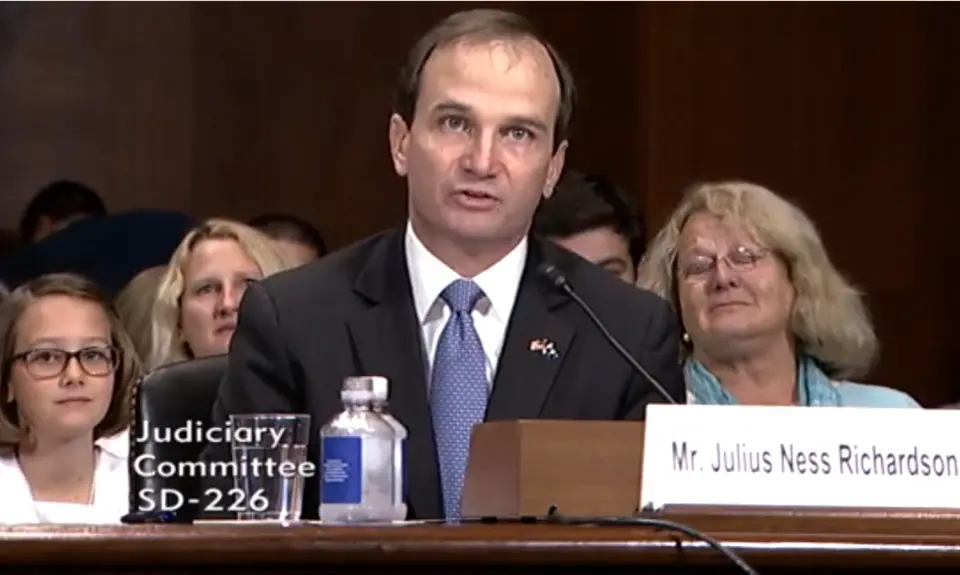“Confirmed Judges, Confirmed Fears” is a blog series documenting the harmful impact of President Trump’s judges on Americans’ rights and liberties. Cases in the series can be found by issue and by judge at this link.
In Perez v. Cuccinelli in February 2020, the Fourth Circuit ruled that the U.S. Citizenship and Immigration Service (CIS) had improperly denied special immigrant juvenile (SIJ) status to a Guatemalan teenager who fled parental abuse and neglect to live with his brother in the U.S. The majority ruled that CIS had misinterpreted federal law to require that there must have been a permanent custody order before such status should be granted. But Trump judges Marvin Quattlebaum, Julius Richardson, and Allison Rushing tried to uphold the CIS ruling in a dissent, the majority explained, that “denies the reality” of the case.
In late 2013, at the age of 16, Felipe Perez Perez came to the U.S. to live with his older brother Mateo in North Carolina. Mateo sought legal custody of Felipe because, as a state juvenile court later found, Felipe was “abandoned, neglected, and abused” by his parents and was “forced” to “migrate to the United States to seek refuge” with his brother. The court also found that “[r]eunification with his biological parents is not viable due to abuse, neglect, [and] abandonment.” The custody proceedings were somewhat delayed, but in June 2015, the state court concluded that it was in Felipe’s “best interest” for Mateo to have “temporary and permanent custody” and granted him temporary custody. A final hearing on permanent custody was set for late July.
Shortly after the June custody order, Felipe applied for SIJ status. Under federal law, anyone under 21 who seeks permanent residence or citizenship if a U.S. “juvenile court” has “placed [him] under the custody” of someone other than a parent and “reunification” with one or both parents is “not viable” is eligible for SIJ status. CIS denied the application[, however, because it interpreted the law as requiring a permanent custody order and a finding of permanent non-viability of reunification, although it “failed to identify any authority in support of its view.” (No permanent order was entered in Felipe’s case, because he turned 18 prior to the scheduled late July hearing and under state law, the juvenile court no longer had jurisdiction.)
After initial administrative and judicial appeals, which found for CIS, the full Fourth Circuit Court of Appeals agreed to consider the case. Judge Robert King wrote the majority opinion, which reversed the previous ruling, and held that CIS was wrong in requiring a permanent custody order and permanent finding of non-viability. As the majority explained, CIS’ view “defies the plain statutory language” of federal law and “impermissibly intrudes into issues of state domestic relations law.”
The majority went on to find that the language of the federal statute was “clear and unambiguous” that neither a state court finding “of the permanent non-viability of reunification nor a permanent custody order is required,” noting that if Congress had so intended, “it easily could have said so.” By requiring such permanent orders and findings, the majority elaborated, CIS’ interpretation “demands rulings” that “state juvenile courts may be unwilling or unable to render.” Under CIS’ view, the majority pointed out, a state juvenile court may be forced to choose between “exercising its full discretion and authority in child-custody matters” and “unduly disqualifying an immigrant juvenile from SIJ status.” The majority directed CIS to reconsider Felipe’s application using the proper legal interpretation.
Judge Quattlebaum wrote a dissent, joined by Judges Richardson and Rushing and several others. They claimed that CIS was not making a categorical determination that a permanent custody order was required, but instead was making an individualized assessment that should be deferred to by the court. Quattlebaum also asserted that the majority opinion placed the court’s “stamp of approval on a brazen scheme [by Felipe] to game our federal immigration system.”
The majority strongly rejected these claims. The dissenting opinion, the majority explained, “rests on a house of cards and reviews not what” the CIS “actually said, but what our dissenting colleagues suggest” the CIS “could have and should have said.” The majority carefully reviewed the record in the case and reaffirmed that the CIS’ rejection of Felipe’s application was based on the erroneous “bare premise that he was obliged, but failed, to present a permanent custody order and a corresponding finding of the permanent non-viability of reunification.”
The majority was even more critical of the dissent’s attempt to “demonize Felipe,” calling it “wholly inappropriate, unfair, and dispiriting.” The majority pointed out that there was absolutely no determination by CIS or any court that Felipe was acting “dishonestly or corruptly,” and the dissent’s inferences to the contrary were “patently unreasonable.” The majority concluded that there was “no justification for the dissent’s dismal portrait of Felipe.”
Fortunately, that “dismal portrait” was rejected by the majority, and Felipe will have another chance to obtain SIJ status.
